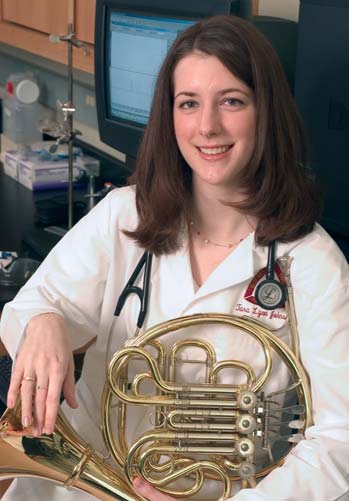
“I definitely have a lot of energy,” says Tara Johnson ’02, ’02 (Peabody) with a laugh. And it shows—at just 23, she has redefined the meaning of high performance. In just six years since beginning her academic career at the Johns Hopkins University, she has completed two undergraduate degrees with honors, won a major national scholarship, and is heading into her third year at the Johns Hopkins School of Medicine while serving on two highlevel volunteer leadership groups for the Whiting School of Engineering.
Growing up in Kingsville, Maryland, Johnson admired her father, Carl Johnson, M.D., an orthopedic surgeon on the Hopkins medical faculty and clinical staff. “I remember telling everyone as a little girl that I wanted to be a doctor like my dad,” she recalls.
At the same time, a parallel interest emerged in music. She began playing the piano by age 7, and the French horn, her favored instrument, at 10. By high school, the study of engineering had entered the picture. “I had all of these interests going on at the same time, and I wanted to pursue all of them in some way to make sure that I made the right final decision,” she says. “That is why I decided to pursue both biomedical engineering and music.”
Johnson readily admits that Hopkins was her first choice. “I put off my interviews at other schools until I had heard from Hopkins,” she says. “The University’s doubledegree program was perfect for my needs.” Johnson’s two bachelor’s degrees—in Biomedical Engineering at the Whiting School and in Musical Performance at the Peabody Conservatory of Music—would seem ambitious in itself. Even so, she pushed herself to raise the bar, graduating from the five-year program in just four years with both general and departmental honors. “I doubled up on courses every semester, sometimes taking over 30 credits,” she remembers. “So I learned how to manage my time.” She graduated with twice as many credits as required.
Along the way, she was named to the Golden Key Honor Society, the Engineering Honor Society, and the Biomedical Engineering Honor Society. And she received the GE Faculty for the Future Fellowship and was a Maryland Distinguished Scholar and a Robert C. Byrd Scholar.
Johnson also volunteered as an academic tutor and advisor and for the Child-Life Program at the Johns Hopkins Hospital. She performed with the Johns Hopkins University Band and the Choral Society. What’s more, she participated in several biomedical engineering research projects, most notably during her three-year stint with the Biomedical Engineering Design Team class. Artin Shoukas, the widely respected professor and researcher who helps teach the class, has nothing but praise for his former student. “She is a remarkable young woman,” says Shoukas. “When one of our Design Team leaders stepped down, she took over the team and did a superb job in leading them.” Johnson returns to the class on a regular basis to judge projects.
In her senior year, Johnson was named one of the first Jack Kent Cooke Foundation Graduate Scholars. Awarded annually by the Jack Kent Cooke Foundation to just 50 outstanding students nationally, the scholarship provides up to $50,000 annually for up to six years of graduate studies in any field. “I was so happy when I got it, I was just jumping up and down,” she says. “The scholarship gave me the financial support I needed to attend the Johns Hopkins School of Medicine.”
Medical school? Why not a career in engineering or music? Johnson considers her current pursuit to be a natural outgrowth of her undergraduate studies. “I had thought about careers in engineering and music, but I really enjoy interacting with other people—with patients— and being able to help them directly. For me, medicine can also be an art, because each patient is different. It’s just like engineering and music, because each discipline requires making creative solutions.”
While she has set her sights on becoming an orthopedic surgeon, Johnson is determined to remain active as an Engineering alumna. She is a member of the Whiting School’s National Advisory Council and the Society of Engineering Alumni Council. “I want to stay involved with the School and make sure that it keeps doing well,” she says. “I have a great deal of loyalty for Hopkins.”




